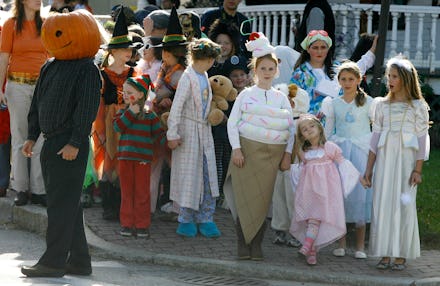War On Halloween in Public Schools is a Symptom Of a Larger Sickness

As has become custom toward the end of October, a number of American public schools have decided to wage war on Halloween, banning costumes or curtailing celebrations outright. Halloween is one of the most fun holidays of the year for children, and unsurprisingly, motivated parents are doing everything in their power to bring it back. Petitions have been signed, pilgrimages have been made to school board meetings, and op-eds are being run in newspapers to right this cosmic injustice. It’s an unfortunate state of affairs that pits teachers and administrators against parents and kids, but it doesn’t have to be this way.
When we harp on these manufactured Halloween controversies, we come face to face with one of the central hypocrisies of modern public education: We ask our public schools to operate in loco parentis and yet we continue to loathe the way they seem to have become an extension of the onerous nanny state. We nitpick every hard, imperfect decision they make as they attempt to help our children grow into responsible adults, forcing trained professionals to adhere to the wisdom of the crowd, and then we blame them for the poor results. Halloween or any other day, we're fooling ourselves to think we can have our cake and eat it too.
Unfortunately, what begins as a series of "gotcha" moments for parents who want to preserve their kids' right to celebrate Halloween in school, quickly turns into an ethos in which we treat the hard-working professionals who educate our kids as unworthy of our trust. This funamentally erodes the social contract that allows for children to be raised in a community of caring adults. There will always need to be safeguards for safety and propriety, some of which will make parents and children upset. But nearly always, these are minor transgressions and not the makings of a sinister conspiracy to ban having fun in school.
Sadly, pundits who should know better, like Nick Gillespie of Reason, have piled on with rhetorical panache that does little to obscure their faulty logic. Truth be told, there are many good reasons to suspend Halloween celebrations, among them concerns about the affordability of costumes in public schools with increasing percentages of poorer students, concern about students sneaking in drugs or weapons, and the fact that students easily get carried away scaring younger kids from behind a mask. Some schools curtail celebrations to protect students with severe allergies or to respect significant minorities within the school population that choose not to celebrate (such as Jehovah's Witnesses), and would otherwise stay out of school that day. Gillespie even argues against killjoys who make America “so afraid of its own shadow that we can’t even enjoy ourselves anymore,” because it’s more important to be fun than to protect against the aforementioned concerns, let alone the stealing, bullying, and hazing that frequently accompany Halloween celebrations. Heaven forbid schools simply say that the day is for learning, and kids can celebrate the holiday after school.
This second-guessing of public schools started long before these recent Halloween controversies, and unsurprisingly it shows no signs of abating. We have found ourselves in a day and age in which all school policies are causes celebres, be they about sex education, curriculum standards, cutting athletic programs, or even yoga pants. A measure of skepticism about curricula and education policy is good, but searching the comment boards of internet articles on these issues, one is confronted by an ugly consistency to call into question the ability of education professionals in public schools.
Frankly, it’s a comfortable default to join in on this self-righteous scapegoating, but it feeds a dangerous narrative that's about far more than just Halloween celebrations. Public schools are open to attacks from the right and the left, from ed-reformers and traditionalists, and all too often from disaffected educators who find themselves without any other target for their frustrations. Consequently, as confidence in our nation’s public schools wanes, more students of means transfer to private, parochial, or charter schools, and others withdraw to be homeschooled, hollowing out the core of a once exemplary system.
If Halloween seemed scary enough without portending the demise of American public education, take heart that there may yet be some solutions. Plenty of excellent opportunities exist in parent-teacher organizations, as class parents, or as school volunteers to make decisions alongside the professionals who educate our kids. There is no better way to foster empathy for the difficult decisions that teachers and administrators make, nor to foster a sense of responsibility for shared outcomes, than to actively take part. Working hand-in-hand to ensure better educationfor all could go a long way toward rebuilding the trust we’ve seemed to have lost of late.
And if we were to ever be as up in arms over numeracy, literacy, and civics as we have been over Halloween, our schools and communities would be immeasurably the better for it.